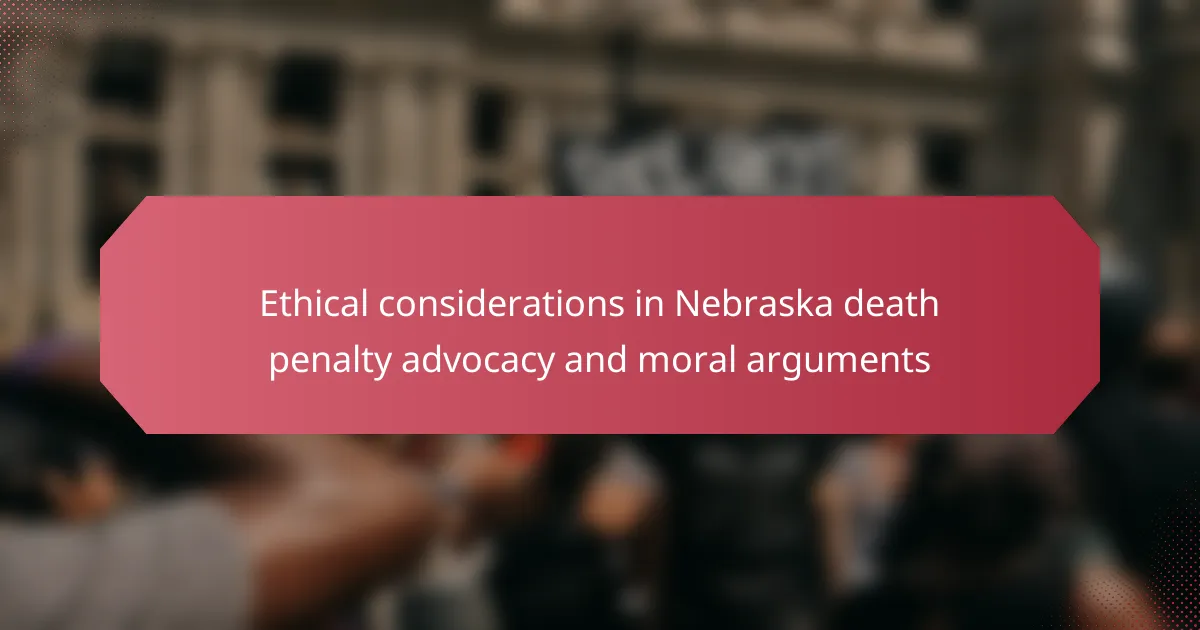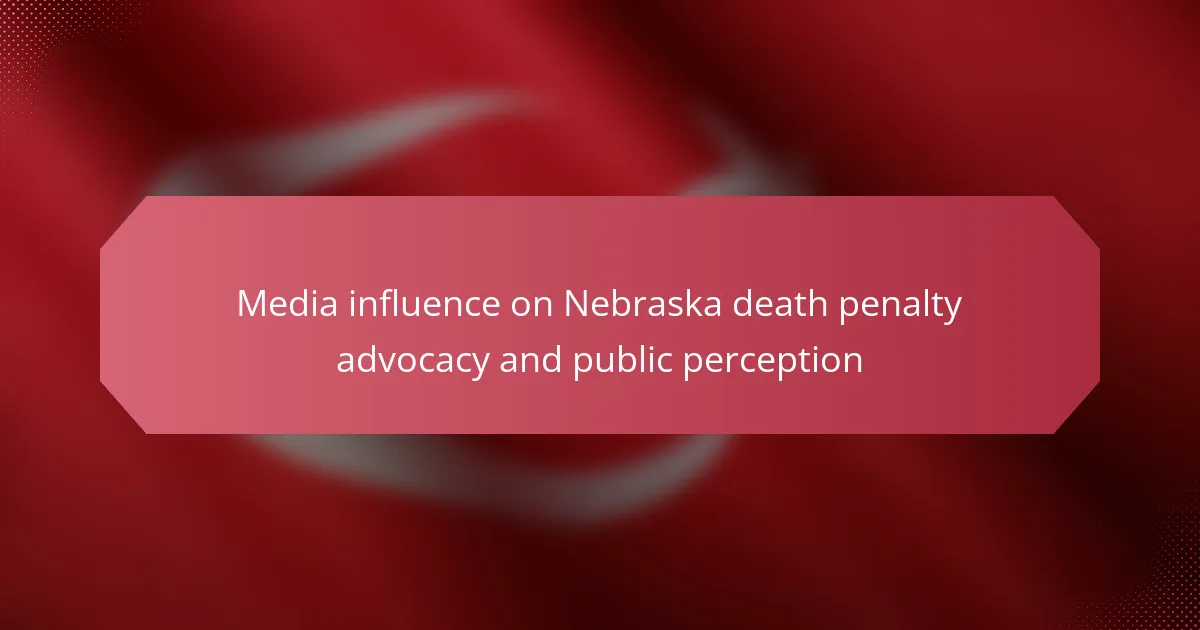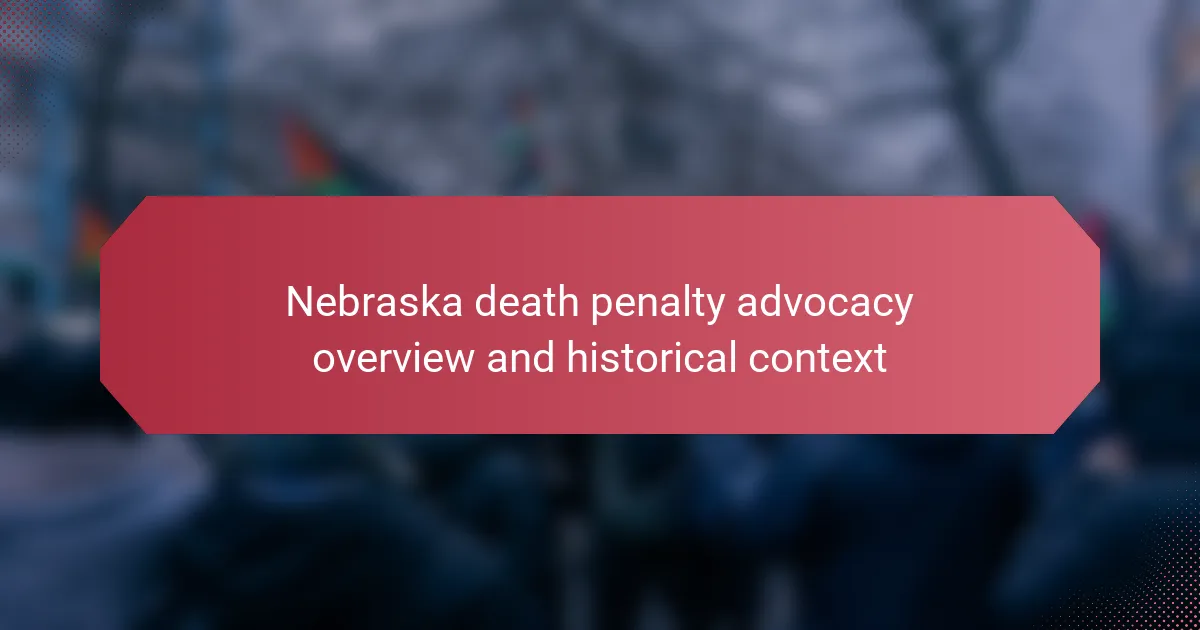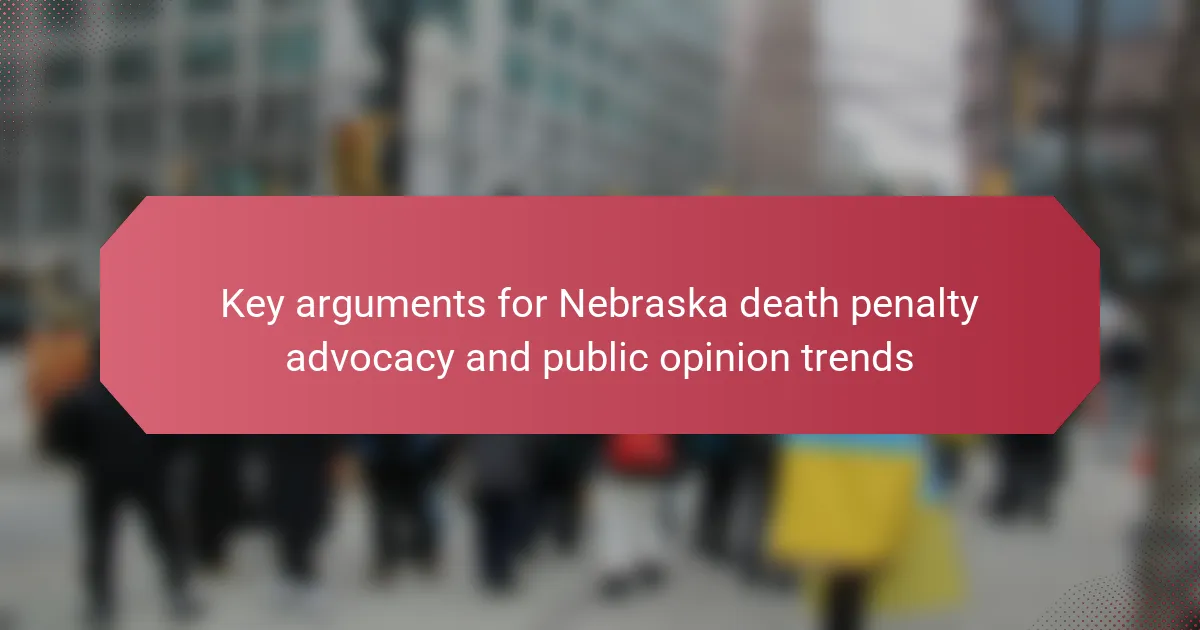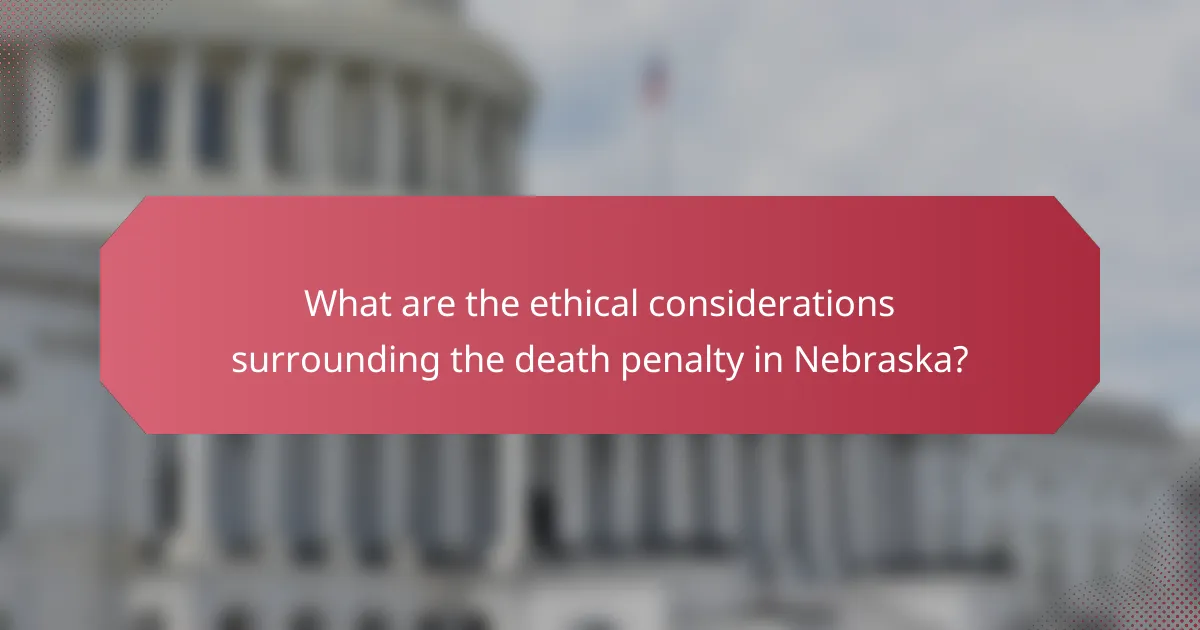
What are the ethical considerations surrounding the death penalty in Nebraska?
The ethical considerations surrounding the death penalty in Nebraska include issues of justice, deterrence, and human rights. Advocates argue that capital punishment serves as a deterrent to violent crime. However, studies show mixed results regarding its effectiveness in reducing crime rates. Additionally, there are concerns about wrongful convictions, as DNA evidence has exonerated individuals previously sentenced to death. The potential for executing innocent people raises significant moral questions about the justice system’s reliability. Furthermore, debates on whether the death penalty constitutes cruel and unusual punishment are ongoing. These discussions reflect broader societal values regarding punishment and rehabilitation. Nebraska’s legal framework also influences these ethical considerations, as state law has undergone changes in recent years. These factors collectively shape the moral landscape surrounding the death penalty in Nebraska.
How do moral arguments shape the advocacy for the death penalty in Nebraska?
Moral arguments significantly influence the advocacy for the death penalty in Nebraska. Proponents often argue that it serves as a form of justice for victims and their families. They believe it deters crime and upholds societal values. Additionally, some advocates claim it provides closure for the victims’ families. Conversely, opponents argue that it is morally wrong to take a life, regardless of the circumstances. They highlight the potential for wrongful convictions and the inhumanity of capital punishment. The Nebraska Supreme Court has also weighed in, considering moral implications in its rulings. These moral debates shape public opinion and legislative actions regarding the death penalty in the state.
What philosophical frameworks influence the moral arguments for and against the death penalty?
Utilitarianism and deontological ethics are key philosophical frameworks influencing moral arguments for and against the death penalty. Utilitarianism supports the death penalty by arguing it deters crime and promotes societal safety. Proponents cite studies indicating that states with the death penalty may experience lower murder rates. Conversely, deontological ethics opposes the death penalty on the grounds that it violates the inherent right to life. It emphasizes moral duties and principles over consequences. Critics argue that the risk of executing innocent individuals undermines the moral justification for capital punishment. Additionally, virtue ethics questions the character of a society that employs the death penalty. It suggests that moral character is compromised when a society endorses killing as punishment. These frameworks create a complex landscape of ethical considerations surrounding the death penalty debate.
How do cultural values impact the ethical considerations of the death penalty in Nebraska?
Cultural values significantly shape the ethical considerations of the death penalty in Nebraska. These values influence public opinion and legislative decisions regarding capital punishment. For example, Nebraska’s cultural emphasis on family and community often leads to a preference for rehabilitation over retribution. This perspective raises ethical questions about the morality of executing individuals, especially those who may be rehabilitated. Additionally, religious beliefs prevalent in Nebraska can impact views on forgiveness and the sanctity of life. Surveys indicate that a substantial portion of Nebraskans oppose the death penalty, reflecting a shift in cultural attitudes toward more humane forms of justice. This opposition is often rooted in the belief that the state should not take a life, aligning with broader ethical principles found in many cultural traditions.
What are the key arguments presented by advocates of the death penalty?
Advocates of the death penalty argue that it serves as a deterrent to crime. They believe that the fear of execution may prevent potential criminals from committing serious offenses. Additionally, they assert that it delivers justice for victims and their families. The death penalty is viewed as a fitting punishment for heinous crimes like murder. Advocates also claim it provides closure to victims’ families. They argue that life imprisonment may not adequately punish offenders. Furthermore, supporters emphasize the importance of retribution in the justice system. They believe that certain crimes warrant the ultimate punishment to reflect societal values.
What justifications do advocates provide for the use of the death penalty?
Advocates for the death penalty justify its use primarily on the grounds of deterrence, retribution, and closure for victims’ families. They argue that the death penalty serves as a deterrent against violent crime. Studies, such as those by economists like Hashem Dezhbakhsh and Paul H. Rubin, suggest a correlation between capital punishment and reduced murder rates.
Additionally, advocates claim that the death penalty provides a sense of justice and retribution for heinous crimes. They believe that the severity of the punishment is appropriate for the severity of the offense. Furthermore, supporters argue that capital punishment offers closure to the victims’ families. They assert that knowing the perpetrator has received the ultimate punishment can help families heal.
These justifications are rooted in the belief that the death penalty upholds moral order and societal safety.
How do advocates address concerns about wrongful convictions in their arguments?
Advocates address concerns about wrongful convictions by emphasizing the fallibility of the justice system. They argue that mistakes can lead to irreversible consequences, including executing innocent individuals. Advocates often cite specific cases where wrongful convictions occurred, highlighting systemic flaws. For instance, the Innocence Project reports that DNA evidence exonerated over 375 wrongfully convicted individuals in the U.S. They stress the importance of reforming legal procedures to prevent such errors. Advocates also call for increased transparency and accountability in law enforcement practices. By presenting empirical data and real-life examples, they reinforce their arguments against the death penalty. This approach aims to raise public awareness and promote legislative change.
What counterarguments exist against the death penalty in Nebraska?
Counterarguments against the death penalty in Nebraska include its potential for wrongful convictions. Studies show that innocent individuals can be sentenced to death, with DNA evidence exonerating some after years. Additionally, the death penalty is argued to be a costly process. The expenses associated with legal representation, trials, and prolonged appeals can exceed life imprisonment costs. There are ethical concerns regarding the state’s role in taking life. Many argue that capital punishment is inhumane and violates the right to life. Furthermore, the death penalty does not effectively deter crime. Research indicates that states without capital punishment have similar or lower murder rates. Lastly, there is a disproportionate application of the death penalty based on race and socioeconomic status. Data shows that minorities and the poor are more likely to receive death sentences.
How do opponents argue against the moral legitimacy of the death penalty?
Opponents argue against the moral legitimacy of the death penalty by asserting that it violates the fundamental right to life. They claim that taking a life, even as punishment, is inherently immoral. This perspective is supported by religious and ethical beliefs that emphasize the sanctity of life. Additionally, opponents highlight the potential for wrongful executions, citing cases where innocent individuals have been sentenced to death. Statistics show that wrongful convictions can occur due to flaws in the legal system. Furthermore, critics argue that the death penalty disproportionately affects marginalized communities. They point to data indicating racial and socioeconomic biases in sentencing. Lastly, opponents contend that the death penalty does not effectively deter crime. Research has shown that states without the death penalty often have lower murder rates. These arguments collectively challenge the moral justification of capital punishment.
What are the implications of the death penalty on marginalized communities?
The death penalty disproportionately affects marginalized communities. These groups often face systemic inequalities in the criminal justice system. Research indicates that racial and ethnic minorities are more likely to receive death sentences. For example, a study by the American Civil Liberties Union found that Black defendants are more likely to be sentenced to death than white defendants for similar crimes. Economic disparities also play a significant role. Marginalized individuals often lack access to quality legal representation. This can lead to higher conviction rates and harsher sentences. Furthermore, the death penalty perpetuates cycles of poverty and trauma in these communities. The implications extend beyond individual cases, impacting community trust in the justice system. Overall, the death penalty exacerbates existing social injustices faced by marginalized populations.
How does public opinion influence the ethical discourse on the death penalty?
Public opinion significantly influences the ethical discourse on the death penalty. It shapes lawmakers’ decisions and public policies regarding capital punishment. When a majority of citizens oppose the death penalty, politicians may reconsider its legality. Surveys indicate that states with higher public support for capital punishment are less likely to abolish it. Conversely, declining public support often leads to legislative changes. For instance, in Nebraska, shifts in public sentiment have prompted debates on the morality of the death penalty. Research shows that ethical arguments against capital punishment gain traction when public opinion leans toward abolition. Thus, public opinion acts as a catalyst for ethical discussions and potential reforms in the death penalty landscape.
What role do religious beliefs play in shaping views on the death penalty?
Religious beliefs significantly influence views on the death penalty. Many religions advocate for the sanctity of life, leading followers to oppose capital punishment. For instance, [censured] often emphasizes forgiveness and redemption. This perspective can result in a preference for rehabilitation over execution. In contrast, some interpretations of religious texts support retributive justice, which may endorse the death penalty. For example, certain Old Testament passages advocate for capital punishment in specific cases. Additionally, various faith communities engage in public discourse about the morality of the death penalty. This engagement shapes societal attitudes and legal policies regarding capital punishment. Overall, religious beliefs create a complex landscape of support and opposition towards the death penalty.
What are the practical implications of ethical considerations in death penalty advocacy?
Ethical considerations in death penalty advocacy significantly impact legal practices and public policy. These implications include the influence on legislative decisions regarding capital punishment. Ethical debates shape public opinion, which can lead to changes in laws and regulations. Advocacy efforts often highlight moral arguments against the death penalty, such as the risk of wrongful executions. This risk is supported by data indicating that wrongful convictions occur in approximately 4% of death row cases. Ethical considerations also promote discussions about human rights and dignity, influencing how society views punishment. Furthermore, they encourage transparency in the judicial process, aiming to ensure fairness and justice. Such advocacy can lead to increased scrutiny of the death penalty’s application, potentially resulting in moratoriums or abolishment in certain jurisdictions.
How can advocates effectively communicate their ethical stance on the death penalty?
Advocates can effectively communicate their ethical stance on the death penalty by using clear, factual arguments. They should present moral reasoning, emphasizing human rights and dignity. Advocates can highlight statistics showing wrongful convictions. Research indicates that around 4% of death row inmates are innocent. They can also reference studies revealing no deterrent effect of the death penalty on crime rates. Engaging personal stories can illustrate the emotional impact of capital punishment. Additionally, advocates should utilize social media and public forums to reach a wider audience. By fostering open dialogue, they can encourage critical thinking about the implications of the death penalty.
What strategies can be employed to engage the public in discussions about the death penalty?
Engaging the public in discussions about the death penalty can be achieved through various strategies. First, hosting community forums allows individuals to express their views and ask questions. These forums can include expert speakers who present factual information. Additionally, utilizing social media platforms can facilitate broader conversations. Campaigns that share personal stories can humanize the issue and evoke empathy. Educational materials, such as pamphlets and videos, can clarify complex legal and ethical aspects. Collaborating with local organizations can expand outreach efforts. Surveys and polls can gauge public opinion and encourage participation. Lastly, promoting open dialogues in schools can foster critical thinking among younger generations. These strategies can create informed and constructive discussions about the death penalty.
The main entity of this article is the ethical considerations surrounding the death penalty in Nebraska. The article examines the complex moral arguments for and against capital punishment, including issues of justice, deterrence, human rights, and the impact of cultural values. It discusses various philosophical frameworks such as utilitarianism and deontological ethics that influence public opinion and advocacy. Additionally, the article highlights the implications of the death penalty on marginalized communities and the role of religious beliefs in shaping societal attitudes. Key arguments from both advocates and opponents are presented, along with strategies for engaging the public in discussions about this contentious issue.
